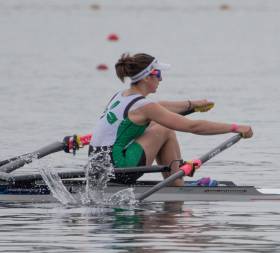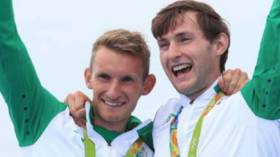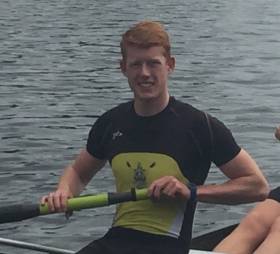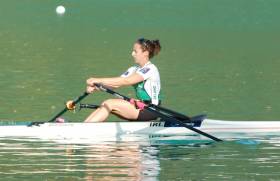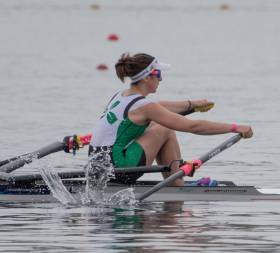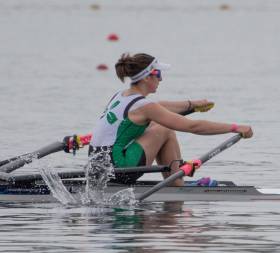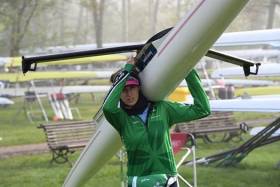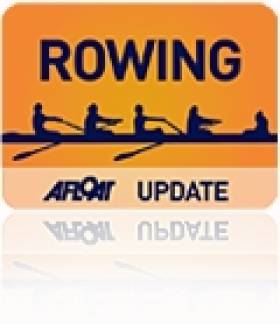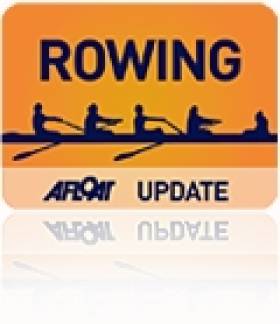Displaying items by tag: Denise Walsh
#Rowing: Denise Walsh gave Ireland a tremendous start to the World Cup Regatta in Belgrade today. The Skibbereen woman came from way down at 1500 metres to win her heat and qualify directly for the final of the lightweight single sculls. Through most of the middle of the race Joanna Dorociak of Poland seemed to have the race won with some ease and Pauline Delacroix of Switzerland filled the second qualifying spot. But Walsh upped the rate to over 40 strokes a minute in the final 500 metres and passed both women.
Patricia Merz of Switzerland dominated the other heat, with Russia’s Anastasia Lebedeva taking the other A Final place available in that race.
World Cup Regatta, Belgrade Serbia, Day One (Selected Results; Irish interest)
Women
Lightweight Single Sculls – Heat Two (First Two to A Final; rest to Repechage): 1 Ireland (D Walsh) 8:07.51, 2 Poland (J Dorociak) 8:08.22; 3 Switzerland Two 8:11.65
O'Donovans Back in Action at World Cup Regatta
#Rowing: The 2017 World Rowing Cup series starts in Belgrade, Serbia tomorrow (Friday), running until Sunday. The regatta has attracted rowers from 26 nations and ranking among the medal prospects are athletes who won medals at the Rio 2016 Olympic Games. Ireland’s O’Donovan brothers, Paul and Gary, are back together for 2017 following their Olympic silver medal performance in the lightweight men’s double sculls, with their most notable competition being two of Great Britain’s most experienced lightweight rowers – Peter Chambers and Will Fletcher.
Shane O’ Driscoll and Mark O’Donovan will race in the men’s pair, in both the lightweight and heavyweight categories. Two-time Olympian Sanita Puspure will once again compete in the women’s single sculls, while Denise Walsh will feature in the lightweight equivalent. Puspure will come up against frequent opponent and fellow Rio Olympian, Belarussian Ekaterina Karsten. Puspure lost out to Karsten in the quarter-finals in Rio and went on to finish five positions back from her, in 13th place.
This is the first of three World Cup events in 2017. The season opener is generally an opportunity for teams to experiment with athletes and crews and see which combinations may work for the season ahead. In this post-Olympic year, it will be particularly interesting to see what the opposition holds due to retirees, new athletes/combinations and new talent emerging.
Friday’s start times are as follows (Irish times/all heats):
Lightweight Women’s Single Scull
09:05 – Denise Walsh (Skibbereen RC)
Men’s Pair
09:30 – Mark O’ Donovan (Skibbereen RC)/Shane O’ Driscoll (Skibbereen RC)
Women’s Single Scull
10:20 – Sanita Puspure
Lightweight Men’s Double Sculls
10:50 – Gary O’ Donovan (Skibbereen RC)/Paul O’ Donovan (UCD BC)
#Rowing: Skibbereen brought their tally of titles for the Irish Rowing Championships to a remarkable 10 so far as Denise Walsh and Shane O'Driscoll had big wins in the lightweight single sculls in the morning session of the third day.
Shandon's win in the men's junior double was a sweet one for Stephen O'Sullivan and Ronan Byrne. They led Clonmel all down the course and held off push after push in the final 500 metres. Strokeman O'Sullivan shouted with joy at the finish, but it was a particularly big win for Byrne. He had been beaten by the Clonmel strokeman, Daire Lynch, in the junior single. Byrne and Lynch team up in the Ireland junior double for the World Championships.
Cork Boat Club's good run in junior events continued, as Amy Mason and Tara Hanlon won the junior pair. Portora won the men's intermediate pair and NUIG the club coxed four. Commercial led all the way in the women's intermediate four and had a clearwater margin at the finish.
Irish Rowing Championships, National Rowing Centre, Day Three (Selected Results, Finals)
Men
Four - Club, coxed: NUIG 6:33.156.
Pair - Inter: Portora 6:49.900.
Sculling, Double - Junior: 1 Shandon A 6:36.777, 2 Clonmel 6:39.324, Castleconnell A 6:51.168.
Lightweight Single: 1 Skibbrereen (S O'Driscoll) 7:15.482, 2 Skibbereen (A Burns) 9:08.433, 3 Carlow (O Nolan) 7:36.764.
Women
Four - Inter, coxed: Commercial 7:20.348.
Pair - Junior: 1 Cork 7:35.640, 2 Bann 7:41.453, 3 Shannon 7:41.750
Sculling - Lightweight Single: Skibbereen (D Walsh) 7:54.535, 2 Carlow (A Byrne) 8:21.130, 3 Queen's (R Brown) 8:33.287.
Walsh Takes Chance after Capsize and Finishes With Win
#Rowing: Denise Walsh recovered from her dramatic capsize on Friday at the World Cup in Poznan with a controlled performance which won her the D Final of the lightweight single sculls this morning. The Skibbereen woman had been rescued from the water in her repechage, but showed courage to climb back into the boat and complete the race. She was originally listed as not finishing, but her brave action was recognised as she was given a time and qualified for the D Final. The Skibbereen woman was untroubled by Rojjana Raklalo of Thailand, and beat her by 21 seconds.
World Cup Regatta, Poznan, Poland (Irish interest; selected results)
Women
Lightweight Single Sculls - D Final (Places 19, 20): 1 Ireland (D Walsh) 8:04.66, 2 Thailand (R Raklao) 8:25.85.
Walsh Third in Rain and Wind in Poznan
#Rowing: Denise Walsh had to settle for third and a place in the repechage of the lightweight single sculls at the World Cup regatta in Poznan, Poland. In deteriorating conditions with a building wind and squalls, Aja Runge Holmegaard of the Netherlands won. Walsh was in with a chance of taking the second qualifying place, but was pushed out of it in the third quarter by Amber Van Zomeren of the Nethlerlands.
World Cup Regatta, Poznan, Poland (Irish interest; selected results)
Men
Lightweight Double Sculls - Heats (Winner to A Final; rest to Repechages) - Heat One: 1 France 6:19.48; 3 Britain (W Fletcher, R Chambers) 6:25.13.
Heat Two: 1 Norway 6:18.90; 2 Ireland (G O'Donovan, P O'Donovan) 6:19.45, 3 Austria 6:34.23.
Women
Lightweight Double Sculls - Heats (Winner to A Final; rest to Repechages) - Heat One: 1 Netherlands 7:04.01.
Heat Two: 1 Ireland (C Lambe, S Lynch) 7:05.36; 2 Poland 7:06.48, 3 Netherlands Two 7:09.28.
Lightweight Single Sculls - Heat Two (First Two to A/B Semi-Finals; rest to Repechages): 1 Denmark (A Runge Holmegaard) 7:55.99, 2 Netherlands Three (A Van Zomeren) 7:56.83; 3 Ireland (D Walsh) 8:11.09.
Walsh Wins Repechage to Take Place in A Final
#Rowing: Ireland has its first finalist of the European Rowing Championships. Denise Walsh pulled off a surprise win in her lightweight single sculls repechage from lane one. The Skibbereen woman started well and led to half way, but by then Imogen Walsh, the defending champion from Britain, had moved up right beside her. The Briton then took over the lead and both moved clear of the field. Denise Walsh to resumed her place in the lead before the finish line. Both Walshs qualified for Sunday’s final.
European Championships, Brandenburg, Germany – Day Two (Selected results, Irish interest)
Women
Lightweight Single Sculls – Repechage (First Two to A Final; rest to B Final): 1 Ireland (D Walsh) 8:39.41, 2 Britain (I Walsh) 8:41.08.
Walsh Wins B Final At World Cup Regatta
#Rowing: Denise Walsh won the B Final of the lightweight single sculls at the World Cup Regatta in Varese in Italy. The Skibbereen woman fought off Swiss and Algerian opponents to take seventh place overall at the event. Siobhán McCrohan, the second Ireland crew, withdrew.
World Cup Regatta, Varese – Day Two (Selected Results, Irish interest)
Men
Lightweight Four – C Final (places 13 to 16): 1 Canada One 6:09.73, 2 Serbia 6:11.21, 3 Austria 6:15.85, 4 Ireland (L Seaman, M O’Donovan, L Keane, S O’Driscoll) 6:16.00.
Lightweight Double Sculls – A/B Semi-Finals (First Three to A Final; rest to B Final) – Semi-Final One: 1 Ireland (P O’Donovan, G O’Donovan) 6:19.57, 2 Netherlands One 6:20.69, 3 Belgium One 6:20.85; 4 Poland One 6:22.21, 5 Switzerland One 6:24.99, 6 Portugal One 6:51.45. Semi-Final Two: 1 South Africa 6:19.42, 2 Spain 6:22.08, 3 Denmark 6:22.09; 4 Turkey 6:22.09.
Women
Pair – C Final (places 13 to 16): 1 Norway One 7:22.74, 2 Ukraine 7:23.16, 3 Ireland (L Kennedy, B O’Brien) 7:33.07.
Single Sculls – A/B Semi-Finals (First Three to A Final; rest to B Final) – Semi-Final One: 1 Ireland (S Puspure) 7:26.60, 2 Belarus Two (T Kukhta) 7:27.86, 3 Canada (C Zeeman) 7:29.01; 4 Ukraine 7:30.70, 5 Sweden 7:37.22, 6 Latvia 7:37.48. Semi-Final Two: 1 Belarus 7:29.10, 2 Switzerland 7:29.93, 3 China 7:31.28.
Lightweight Double Sculls – C Final (places 13 to 17): 1 Ireland (C Lambe, S Jennings) 7:17.24, 2 Italy Three 7:26.29, 3 Chile 7:29.71.
Lightweight Single Sculls – Repechage (First Two to A Final; rest to B Final): 1 Poland Two 7:49.90, 2 Switzerland One 7:51.76; 5 Ireland Two (S McCrohan) 8:04.69, 6 Ireland One (D Walsh) 8:08.81. B Final: 1 Ireland One (D Walsh) 7:50.00, 2 Switzerland 7:52.51, 3 Algeria 7:58.6.
Ireland Lightweight Double Pipped for World Rowing Semi-Final Spot
#ROWING: Sweden pushed Ireland out of the vital second spot in the repechage of the lightweight double sculls at the World Rowing Championships in Amsterdam today. The race developed into a three-boat battle to land the two spots in the A/B Semi-Finals: world champions Italy and Ireland, who had a very good third quarter, led early leaders Sweden at 1500 metres. The Swedes came back, however, and pipped Ireland by .51 of a second. Ireland's Claire Lambe and Denise Walsh are now set to compete in the C/D Semi-Finals.
World Rowing Championships, Amsterdam, Day Three (Selected Results; Irish interest)
Women
Lightweight Double Sculls – Repechage Four (First Two to A/B Semi-Finals; rest to C/D Semi-Finals): 1 Italy (L Milani, E Sancassani) 7:40.06, 2 Sweden (C Lilja, E Fredh) 7:43.11, 3 Ireland (C Lambe, D Walsh) 7:43.62, 4 Belarus 7:55.20.
Ireland Team For World Under-23 Rowing Named
#ROWING: Rowing Ireland has announced the crews which will compete at the Under-23 World Rowing Championships in Varese, Italy, from 23rd to 27th July.
Denise Walsh will compete in the lightweight single scull. Walsh, who is 22 years old, competed in the same event last year, finishing sixth. She has been competing more recently in a newly formed lightweight double scull with Claire Lambe. They finished in 5th position in the B final in their first outing two weeks ago at World Cup II in Aiguebelette. Denise Walsh rows for Skibbereen Rowing club and is in her final year of studying Economics and Geography at UCC.
Paul O’Donovan finished in third place in U23 lightweight men’s scull in Linz, Austria in 2013. He comes from a strong family of rowers, with his father, Teddy, involved in Skibbereen rowing Club. Paul rowed himself since the age of seven. In the recent World Cup II regatta in Aiguebelette Paul won the B final.
Paul’s brother Gary will compete in the men’s lightweight double, together with fellow Skibbereen man Shane O’Driscoll. Gary is passionate about the sport. “My father always had an interest in rowing and he would bring myself and Paul to a lot of rowing events before we started rowing, which we enjoyed a lot,” Gary recalled. “When I was 10 years old, he brought me and Paul rowing for the first time. Since then we have never stopped.”
Shane O’Driscoll, who was in Gary’s class in school, started rowing shortly afterwards and they have rowed together since.
The men’s four from Galway will be hoping for a good result. Many of the crew have rowed since they were at junior level. Richie Bennett and Rob O’Callaghan competed in the four at last year’s Under-23 World Championships, where they finished ninth. Fionnán McQuillan-Tolan recently lined out in the Boston College eight at the Eastern Sprint regatta. Tolan started rowing at St Joseph’s College and won three junior Championships with them.
Ireland Under-23 World Championship Team:
Men
Four: Fionnán McQuillan-Tolan (Grainne Mhaol RC), Richard Bennett (NUIG BC), Robert O'Callaghan (NUIG BC), Kevin Neville (NUIG BC). Lightweight Double Scull: Gary O’Donovan (CIT RC), Shane O’Driscoll (Skibbereen RC). Lightweight Single Scull: Paul O’Donovan (UCD).
Women
Lightweight Single Scull: Denise Walsh (Skibbereen RC).



























